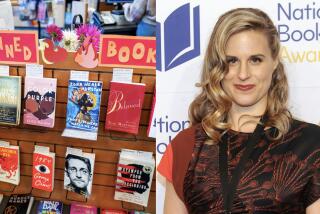Leona Rostenberg, 96; Discovered Secret Racy Side of Louisa May Alcott
Leona Rostenberg, rare book dealer, scholar, author and super sleuth who six decades ago unearthed Louisa May Alcottâs clandestine racier writings, has died. She was 96.
Rostenberg died March 17 in her New York City apartment after two years of heart problems.
It was 1942, and the refined, well-educated Rostenberg was sitting in the Houghton Library at Harvard, elbow-to-elbow with Madeleine B. Stern, the other half of the âHolmes and Watsonâ rare book duo, poring over Alcottâs papers.
They were searching for an answer to hints and rumors that Alcott, author of the wholesome and much-loved coming-of-age novel âLittle Women,â had a darker literary alter ego, penning stories that dare not bear her name.
Suddenly, Rostenberg found what they were looking for -- five letters written to Alcott in 1865 and 1866 by Boston publisher James R. Elliott containing the statement: âWe would like more stories from you ... and if you prefer you may use the pseudonym of A.M. Barnard or any other manâs name if you will.â
It was a moment of Fingerspitzengefuhl, âa tingling in oneâs fingertipsâ or a hunch -- the word Rostenberg, a native New Yorker of Jewish-German descent, used to describe the excitement of discovery in her work, or as she put it, âthe electrifying alertness to what is unusual or important in an early printed book.â
She had found the elusive pen name under which Alcott wrote lucrative âblood and thunderâ stories involving hashish, transvestitism, sadomasochism, violence and feminism to pay her familyâs bills. The Elliott letters also revealed the titles of Alcottâs lurid thrillers and the periodical in which they appeared.
Rostenberg published the blockbuster findings in 1943 as âSome Anonymous and Pseudonymous Thrillers of Louisa M. Alcottâ in the journal Papers of the Bibliographical Society of America.
Rostenberg and Stern described their âwild war whoopâ upon unearthing Alcottâs pseudonym more than half a century later in their bestselling 1997 memoir âOld Books, Rare Friends: Two Literary Sleuths and Their Shared Passion.â Then, the scholars related, âafter an intermission of congratulation, hilarity and several cigarettes, we returned to our seats.â
Their continued research led to Sternâs classic biography âLouisa May Alcottâ in 1950, which was reissued in 1996, and a 1975 book Stern edited, âBehind a Mask: The Unknown Thrillers of Louisa May Alcott.â Books are still being published based on the womenâs discovery more than 60 years ago.
In addition to their well-received 1997 joint autobiography, Rostenberg and Stern published a follow-up memoir in 2001, âBookends: Two Women, One Enduring Friendship.â
Rostenberg wrote half a dozen books on her own, primarily aimed at colleagues within her arcane profession, such as âEnglish Printers in the Graphic Arts 1599-1700â in 1963 and âAn Antiquarianâs Credoâ in 1976. She wrote several more with Stern.
Born on Dec. 28, 1908, Rostenberg graduated from New York University in 1930, the year she met Stern, then a Barnard College freshman. Rostenberg went on to earn a masterâs degree at Columbia and prepared for her doctorate, only to have her dissertation rejected. Columbia reversed itself and gave her a doctorate in 1973, based on the books she had written in the interim.
With hopes dashed for an academic career, Rostenberg became an apprentice to rare book dealer Herbert Reichner, an overbearing mentor who addressed her as âFraulein Dummkopf.â She referred to the period as âfive years in Siberia.â
Rostenberg chose the field of rare or antiquarian books, she once told Contemporary Authors, because: âThe rare book trade offers a triple inducement -- the delights of research, the titillation from possible discovery and a satisfactory income. By its very nature the profession leads to unexplored fields which can be mined and developed with great delight.â
For Christmas 1943, Stern gave Rostenberg business cards, stationery and shipping labels imprinted âLeona Rostenberg -- Rare Books.â
The next year, Rostenberg, certain that she âcould not waste all this marvelously engraved paper,â opened her modest bookstore in a second-floor bedroom of the 14-room family home in the Bronx, where her father, a dermatologist, treated patients on the first floor. She had 60 rare books, alphabetized in an encyclopedia crate, and soon mailed a trade announcement to 2,000 potential customers she compiled from membership lists of literary, historical and bibliographical societies.
In 1945, Stern quit her teaching job and joined Rostenberg to form Leona Rostenberg and Madeleine Stern Rare Books. As good friends and business partners, they went on European buying trips and roamed through libraries and old barns, unearthing such treasures as early 17th century volumes printed clandestinely by Pilgrims such as Elder Brewster before sailing from England aboard the Mayflower.
In 1973, Rostenberg was elected president of the Antiquarian Booksellers Assn. of America, an extremely rare honor for a woman in a predominantly male profession.
The two women, who never married or had children, set up housekeeping together, first in the Bronx house and later in a Manhattan apartment.
They disavowed any lesbian relationship in their memoir, but expressed a âdeep, deep loveâ as friends, scholars, business partners and rare book sleuths. Their 2001 book âBookendsâ included a chapter titled âMen We Did Not Marry.â
Except for Stern, Rostenberg leaves no close survivors.
More to Read
Sign up for our Book Club newsletter
Get the latest news, events and more from the Los Angeles Times Book Club, and help us get L.A. reading and talking.
You may occasionally receive promotional content from the Los Angeles Times.







